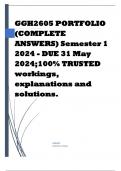Exam (elaborations)
GGH2605 PORTFOLIO (COMPLETE ANSWERS) Semester 1 2024 - DUE 31 May 2024;100% TRUSTED workings, explanations and solutions.
- Institution
- University Of South Africa
GGH2605 PORTFOLIO (COMPLETE ANSWERS) Semester 1 2024 - DUE 31 May 2024;100% TRUSTED workings, explanations and solutions.
[Show more]



